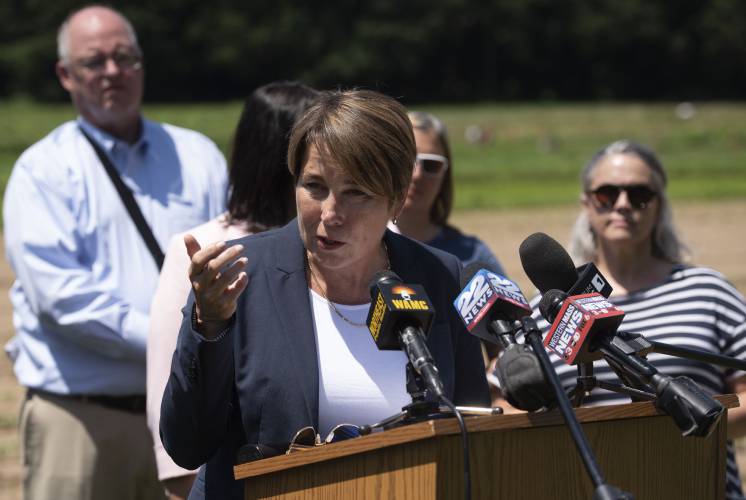Healey urges Congress to reject SNAP cuts

In a letter to Congress, Gov. Maura Healey, pictured in Easthampton, is urging lawmakers to reject changes proposed by Republicans to the Supplemental Nutrition Assistance Program (SNAP). STAFF FILE PHOTO
| Published: 05-16-2025 4:27 PM |
In a letter to Congress, Gov. Maura Healey is urging lawmakers to reject changes proposed by Republicans to the Supplemental Nutrition Assistance Program (SNAP) that would shift much of the expense to the states, which would cost a minimum of $131.4 million annually and potentially as much as $650 million.
Healey said the proposed change, which would alter the administrative sharing formula between the federal government and states from an even split to a 75-25 ratio, would destroy the SNAP system and leave people without food. The proposal to change the administrative sharing formula to the 75-25 ratio would cost Massachusetts an extra $53.3 million annually.
The proposed changes also would require states to shoulder 5% of benefit costs beginning in fiscal year 2028, and that share could go higher for states with high rates of overpayments and underpayments. Currently, states shoulder none of the benefit costs.
SNAP provides food benefits to low-income families to supplement their grocery budget so they can afford nutritious food.
In 2024, more than 1 million Massachusetts residents — one-third are elderly, one-quarter are children and another quarter are disabled — received roughly $2.6 billion in SNAP funds, with the average household receiving about $10.70 a day, according to the governor’s office.
“The federal government and states have spent decades building and running the SNAP program in partnership at the current cost structure,” Healey wrote, “and to shift it at this scale will decimate trust in a longstanding program that supports vulnerable families and strengthens local economies.
“This is an exorbitant burden on Massachusetts,” she continued, “even at the lowest estimate of $184.7 million. The Massachusetts state budget cannot absorb this cost, nor can other states, and that should be no surprise to the federal administration.”
Health and Human Services Secretary Kate Walsh said in an interview that SNAP is a valuable program that alleviates hunger across the nation and is a powerful “economic engine.” It is not, she emphasized, a “windfall for families.”
Article continues after...
Yesterday's Most Read Articles
The benefits of people being able to spend money in the communities where they live, work, worship, go to school, all of those things, I think is really one of the more powerful aspects of the SNAP program locally and nationally,” Walsh said in a phone interview Thursday. “It’s part of a safety net for food in the richest, most powerful nation in the history of the world. It seems like a very draconian cut.”
The proposed changes to SNAP, as well as proposed reductions to Medicaid — serving 40 million and 70 million Americans, respectively — come as the Republican majority in Congress is seeking to pass more than $5 trillion in tax cuts, with SNAP and Medicaid combining for $1 trillion in cuts.
“It is a cruel, mean, rotten bill,” Rep. Jim McGovern, D-Worcester, said as the agriculture panel debated changes to SNAP.
If approved, Walsh said the effects of these cuts would bleed into other sectors, too, as people will have less access to healthy foods, which could lead to health complications
“Between the cuts to federal benefits and the administrative expenses, we would need to find another $710 million annually, which is impossible. It would likely force families into true hunger,” Walsh said. “Ironically, Secretary of Health and Human Services [Robert F.] Kennedy has repeatedly said that poor nutrition is a major health care cost driver in our country, so we’re just exacerbating that problem.”
The bill suffered a stunning setback in the Budget Committee on Friday, though, as several hard-right Republicans joined Democrats in voting against it. The contingent, which helped stall the bill with a 16-21 vote, are seeking steeper cuts to Medicaid and green energy tax breaks implemented during President Joe Biden’s term.
If the cuts make it through further negotiations, they could have a massive impact locally, according to Community Involved in Sustaining Agriculture Communications Manager Claire Morenon.
With an estimated $1.50 generated in local economic activity for every SNAP dollar spent, Morenon said that, on top of more food insecurity in the region, local producers will suffer.
“It goes without saying a lot more people will be hungry and that includes kids, older people and disabled people. On the farmer and local food side, any cut to SNAP has the potential to have huge negative consequences for small local businesses,” Morenon said. “A big cut in SNAP is going to mean there is less money being spent with local farms, farm stands, small locally owned grocery stores — all of those sales outlets are going to have fewer dollars going to them.”
With the terms of the bill still up for negotiation, Healey urged Congress to reject any cuts to SNAP.
“I implore Congress to reject any proposal that would restructure the SNAP program funding model, forcing states to pick up the tab for federal benefits and abandoning billions of dollars of federal responsibility,” Healey wrote. “Massachusetts stands ready to partner with Congress to strengthen SNAP and find new avenues to promote economic mobility.”
Healey’s letter in its entirety can be read at bit.ly/3SImaHG.
Chris Larabee can be reached at clarabee@recorder.com. Material from The Associated Press was used in this report.






 Gov. Healey forms Anti-Hunger Task Force in response to federal SNAP cuts
Gov. Healey forms Anti-Hunger Task Force in response to federal SNAP cuts Firefighters partner with Jumptown to practice water rescues in Orange
Firefighters partner with Jumptown to practice water rescues in Orange South County reporter bids adieu after four years
South County reporter bids adieu after four years Fire chiefs, local officials advocate for new building authority
Fire chiefs, local officials advocate for new building authority
